This article needs additional citations for verification .(April 2018) |
List of magazines in Croatia is an incomplete list of magazines published in Croatia.
This article needs additional citations for verification .(April 2018) |
List of magazines in Croatia is an incomplete list of magazines published in Croatia.

The Croatian Spring, or Maspok, was a political conflict that took place from 1967 to 1971 in the Socialist Republic of Croatia, at the time part of the Socialist Federal Republic of Yugoslavia. As one of six republics comprising Yugoslavia at the time, Croatia was ruled by the League of Communists of Croatia (SKH), nominally independent from the League of Communists of Yugoslavia (SKJ), led by President Josip Broz Tito. The 1960s in Yugoslavia were marked by a series of reforms aimed at improving the economic situation in the country and increasingly politicised efforts by the leadership of the republics to protect the economic interests of their respective republics. As part of this, political conflict occurred in Croatia when reformers within the SKH, generally aligned with the Croatian cultural society Matica hrvatska, came into conflict with conservatives.

The Matica srpska is the oldest Serbian language independent, non-profit, non-governmental and cultural-scientific Serbian national institution. It was founded on June 1, 1826, in Pest by the Serbian habsburg legislator Jovan Hadžić and other prominent members of the Serbian Revolution and National Revival. The Matica was moved to Novi Sad in 1864. It is the oldest matica in the world.

Igor Mandić was a Croatian writer, literary critic, columnist and essayist. According to Croatian historian Slobodan Prosperov Novak, Mandić was the most important and the most versatile Croatian newspaper writer of the second half of the 20th century. His polemic texts have marked a Yugoslav publicist epoch of the 1960s and 1970s. Known for his fresh, sharp writing style and contrarian views, he has been dubbed "the master of quarrel".

Matica hrvatska is the oldest independent, non-profit and non-governmental Croatian national institution. It was founded on February 2, 1842 by the Croatian Count Janko Drašković and other prominent members of the Illyrian movement during the Croatian National Revival (1835–1874). Its main goals are to promote Croatian national and cultural identity in the fields of art, science, spiritual creativity, economy and public life as well as to care for social development of Croatia.
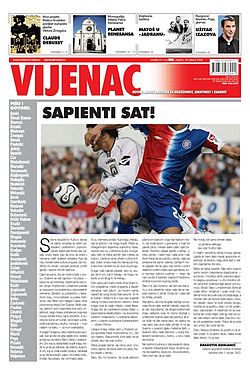
Vijenac is a biweekly magazine for literature, art and science, established in December 1993 and published by Matica hrvatska, the central national cultural institution in Croatia.
The Croatian Publishing and Bibliographic Institute was a lexicographic institute in the Independent State of Croatia founded on August 9, 1941. Mate Ujević was its director. In 1944, Dragutin Tadijanović became the literary secretary of the institute. With the creation of communist Yugoslavia in 1945, the institute's work was stopped.

Zarez was a Croatian biweekly newsprint magazine covering literature, arts, culture and current affairs.
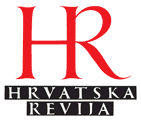
Hrvatska revija is a Croatian quarterly published by Matica hrvatska (MH) based in Zagreb.
Viktor Vida was a Croatian writer.
Slobodan Prosperov Novak, is a Croatian literature historian, comparativist and theatrologist.

The Color Press Group or Color Media International, is a Serbian media company based in Novi Sad, Serbia.
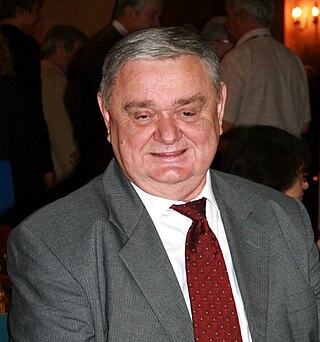
Stjepan Damjanović is a Croatian linguist, philologist and paleoslavist. He worked as a regular professor at the Faculty of Humanities and Social Sciences at the University of Zagreb. He is a former President of Matica hrvatska.

Milivoj Solar is a Croatian literary theorist and literary historian.
Igor Zidić is a Croatian art historian, art critic, poet and essayist. He is considered a top expert on Croatian modern art.
Hrvoje Turković is a Croatian film theorist, film critic and university professor. With 14 books and more than 700 articles on film, ranging from essayistic criticism to scientific works on film theory, Turković established himself as one of Croatia's most important critics and film scholars. He is a recipient of the Vladimir Nazor Lifetime Achievement Award for Contribution to Film.

Croatian Writers' Association is the official association of Croatian writers. It was founded in 1900 in Zagreb with the goal "to unite writers and help them support one another, and promote Croatian literature regardless of political objectives", "to protect the interests and increase the reputation of writers" and "supports its members and their orphans." The DHK's president is Hrvojka Mihanović Salopek, while Željka Lovrenčić and Mirko Ćurić are vice-presidents.
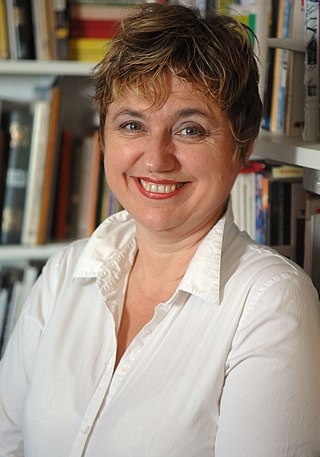
Sanja Nikčević is a Croatian theatre critic and distinguished professor of theatre history in the drama department of the Arts Academy of Osijek, Croatia. She is also head of the drama module of the doctoral program in literature at the Faculty of Philosophy, University of Osijek. She is the president of the Croatian Critics' Association and Governing Board of Matica hrvatska. Nikčević lives in Zagreb, Croatia.
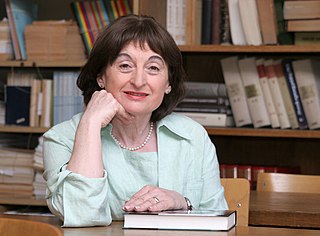
Dubravka Oraić Tolić is a Croatian poet, essayist, translator, and theorist of literature and culture.